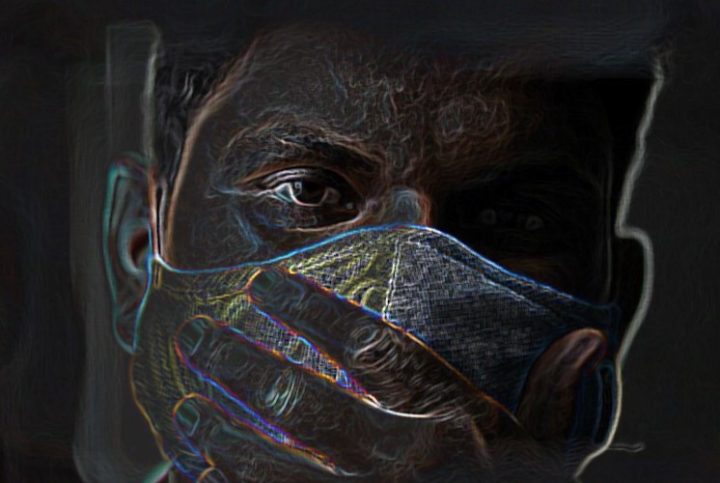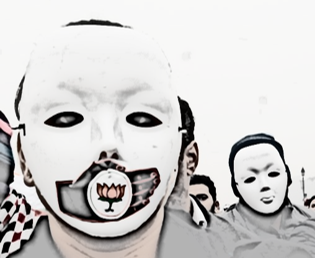Editorial Note: Nilanjan Dutta writes from India. In this essay he raises legitimate questions about the corralling of citizens by the state, using the pandemic as an excuse, and its exploitation of lock-down measures and terror to erode people’s will to resist the larger enemy of systemic, widespread profiteering—also known as neoliberal capitalism and globalization.
While Canada and certain parts of the world did not impose heavy lockdown measures and curfew, in India and some other countries, only four hours’ notice was given at midnight to “stay at home and not come out,” which created enormous hardship for the poor and for migrant workers left homeless, unemployed, and exposed to the elements. Nilanjan refers to “the mask” not only as a protective device, but also as a metaphor for gagging and prodding the population so that “we are becoming amicable to the idea of a strong and omniscient state.”
The Mask and the Face
Which is a mask, which is the face?
Nothing can be seen clearly. I feel
helpless as one feels after a terrible fever.
Memories haunt my brain; near the head,
Near the feet, my desires are dark
Like kisses of snakes; and in sleep
My dreams can’t even breathe.
Birendra Chattopadhyay
July 6, 1968
Once upon a time, people used to tie a piece of cloth over their faces when they came out in the street to demonstrate. The cloth could signify several things: if something terrible had happened, it could mean that those who were protesting were at a loss to find appropriate words to condemn it. Or, it could indicate a gag on freedom of expression. In some cases, the demonstrators could use it for concealing their identities, or to protect themselves from being tear gassed by the police. It is also not uncommon in certain parts of India to use masks as protection against the high levels of pollution.
Now, a large majority of the people around the world can be seen in the streets with a cloth covering their faces, and they are not demonstrating against anything. The face cover is being called a mask, which they are wearing to protect themselves and others around them, not from the roving eye of the state—that is no longer possible with the help of such a simple device—but from a common enemy called COVID-19. Hiding behind a mask will not attract any censure now. Not wearing one will.
Like in “lockdown,” most people would not want to go out and risk being called weirdos who don’t want to participate in this great nationalist exercise to “break the chain of infection.” Not even those who would otherwise jump into the frontlines of resistance to break a curfew. Why is this so?
I got my answer in an article about the current situation in the West Bank, featuring a conversation between Amahl Bishara, associate professor at Tufts University, and Nidal Al-Azza, director of the Bethlehem-based Badil Resource Center for Palestinian Residency and Refugee Rights. . Nidal Al-Azza says:
Palestinians are used to being trapped under military curfew, so maybe they know how to cope. But this is different. In a curfew imposed by occupying forces, Palestinians seek to challenge it. They impose a curfew, and we break it. But today, there is not that desire. This time, staying home is required to protect your family, yourself, your neighbors, your people.
That is why we accept what the state tells us to do. And the state talks to us without pretence, without putting a mask on. It does not need one. For we have become convinced by now that the state is our protector. Even if it is the same state that a few months ago used to bark at us orders that we were loath to follow. If I feebly try to question the logic of any of the state diktats regarding the “proper code of conduct in the time of corona pandemic,” I would see friends’ and comrades’ jaws beneath the mask stiffen: “I hope you are not talking about shunning protection?” Curiously enough, the state itself cannot protect its most loudmouthed leaders. Masked or unmasked. Be they Bolsonaro and his wife, his deputies, the Indian Home Minister Amit Shah, several of Trump’s entourage, the Bolivian President, or princely royalty and famous film stars, who energize and propagate the hegemony of the state in so many ways.*
**Editorial note: As we go online, not only have several key members of Trump’s entourage become infected by COVID-19, Trump and his wife have also tested positive.
Talking about herd immunity is a taboo. “Just look at Sweden, they did not lock down and dreamed that herd immunity would come and save them. Now the country is boiling in a COVID soup.” As of the last day of July, Sweden had a total of 5,755 deaths, 80,359 cases and 2,566 in intensive care. Its average death rate over the last seven days of that month was seven deaths per day. Up to the same date, the United Kingdom recorded 302,301 cases, Spain 285,430, Italy 247,158, Germany 207,828, and France 186,573. The death figures were: United Kingdom 45,999, Italy 35,132, France 30,254, Spain 28,443, Belgium 9,840, Germany 9,134 and Netherlands 6,147. These stats may take any turn by the time this write-up sees the light of day. But I am just looking for some rationale behind branding Sweden as a rogue nation as far as COVID management is concerned. Sweden tried something. It didn’t pan out as planned, but now conditions have somewhat stabilized.
States across the globe have created a “mainstream discourse” that we have all learned to accept. And if we stop questioning, we will learn to accept that whatever they ordain—from a free run of the “market forces” to a “lockdown”—must be in our interest. They need to teach us this, because it is essential for the success of a common project that they are pursuing—to save capitalism.
Once all our states had opened their doors to facilitate a great economic tide called “globalization.” It had given a fillip to capitalism after the Cold War fatigue. Now if they are closing borders and again cocooning up national economies, it is because capitalism needs another phase of nanny handling. It has never really been able to recover fully from the shock of 2008. The so-called fourth industrial revolution which aims at giving machines a mind of their own only immerses it into a deeper gorge of diminishing jobs and demand. Economies such as India and Brazil, which seemed to survive the previous tremor unscathed, were showing signs of jitter for a few years before this new coronavirus appeared on the scene. We all know the story and need not recount it here.
So, capitalism must be saved after all. The age of COVID-19 has brought about the much- needed trust between the unmasked state in its full benevolence and command and control visage, and us with a mask, in compliance whenever possible. The ‘war’ metaphor is also reigning supreme: the war against the virus, the war against the enemies of capitalism. We must win all. And who doesn’t know that during a war, it is the duty of every citizen to rally behind the state?
We will do that willingly because we have also learned that only capitalism can save our lives. It has control over modern science and scientific research for vaccines and remedies to take us out of this pandemic mess. We are becoming more and more amicable to the idea of a strong and omniscient state. We are not questioning why the state, in its bid to enforce the lockdown and mask-wearing regime, is handling the COVID-19 situation as a law-and-order issue rather than a public health emergency.
All power to the police—that is the order of the day. (See, for example, “Teargas, beatings and bleach: the most extreme Covid-19 lockdown controls around the world” and “Policing under coronavirus: the real test is yet to come.”)
Numerous apps and devices are appearing to assist in the noble cause of “contact tracing.” But history tells us that police power and surveillance networks will not be put to noble use if, after winning the battle against the new coronavirus tomorrow, the people of the world go back to their war against capitalism the day after.
We will be powerless then if we surrender our right to raise questions now—however “naive” and “irrational” our questions may be. Have the pundits who polish up the policies of the state proven themselves to be unfailingly rational? Managing the global pandemic situation would not have become so messy if they had.
Even within the scientific community, there are interesting counterpoints. For example, listen to what Vikram Patel, the Pershing Square Professor of Global Health at Harvard Medical School, has to say:
It is perhaps not surprising that some scientists vociferously called for governments to act swiftly to impose lockdowns. After all, most of my community, and the government officials who conjure and implement these policies, enjoy salaried jobs which can seamlessly pivot to online platforms which we can operate with ease from our spacious homes in which being locked down can evolve into a rather congenial opportunity to master culinary skills and not have to commute to work. It will not surprise me if the reputation of scientists, already tainted in some quarters as being elitist, will be further muddied by our role in this pandemic.
While there are diverse opinions in the scientific community, too, we are being bombarded with the sermons of only those whose pronouncements are favourable for the state policies of policing the pandemic. This, we are told, is the “new normal.” The state will wear the mask of “returning to normal” (which is non-masked) and carry out all its projects without any pretension. And we, wearing a mask, will keep silent.
Capitalism knows how to make a contract even with the Devil and profit from it. The Black Death in 14th-century Europe had provided it the right conditions to germinate and grow (like a virus does when it gets into the human body). The corona pandemic might offer capitalism a second life. It is up to us whether we will allow it the opportunity by not questioning the “new normal” now. If we allow that, we will also accede to capitalism’s moral right to trigger future pandemics and epidemics—by destroying the forests, causing polar ice to melt, conducting some deadly experiment in the laboratory, or something that we are not able to think of as yet.










